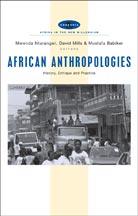African Anthropologies
Keywords:
African Anthropologies, post-colonial, governmentSynopsis
Dakar, CODESRIA, 2006, 176 p., ISBN 2-86978-168-7
This landmark volume on the history, application and teaching of anthropology in post-colonial Africa shows how the continent’s anthropologists are redefining the historical legacy of European and American disciplinary hegemony, and developing distinctively African contributions to anthropological theory and practice. While illustrating the diverse national traditions of anthropological practice that have developed in sub-Saharan Africa since decolonisation, the contributors exemplify the diversity of professional work carried out by the discipline’s practitioners, united by their use of anthropological perspectives to make a difference. Their commitment to this disciplinary identity demonstrates the place that exists for a critical anthropology that is reflective about both its potentials and limitations.
‘This book uses the “expansive moment” of African anthropology under late colonialism to re-explore the relationship between government and the discipline, pulling together three strands to the arguments: the historical identification of what specific anthropological endeavours actually did under colonial conditions; the complex relationship between anthropology and nationalism in Africa; and the exploration of what “practice” entails within national contexts in the present.’ - Jane Guyer, Johns Hopkins University.
‘This is a fresh and important new overview of the place of anthropological research and practice in Africa, past and present.’ - Wendy James, Oxford University
"This is a timely and extremely valuable contribution to the ongoing debate about the crisis of identity in anthropology, offering fresh and unique insights into the fundamental challenges facing African anthropology. The volume focuses on the theoretical, epistemological, and practical problems resulting from Africa’s encounter with Euro-colonialism and addresses the difficulties, limitations, achievements, and potential of African anthropology — the ’mother’ of Africa Studies — from the perspective of ’insiders’." - Maxwell Owusu, University of Michigan
"Here is a book teachers of African anthropology have been hoping for - an intervention that lays to rest the notion of anthropology as colonial science. Released from the "Africanist" confines, anthropology assumes its rightful place in the reflexive and engaged production of knowledge on and for Africa." Harri Englund, University of Cambridge
Downloads






